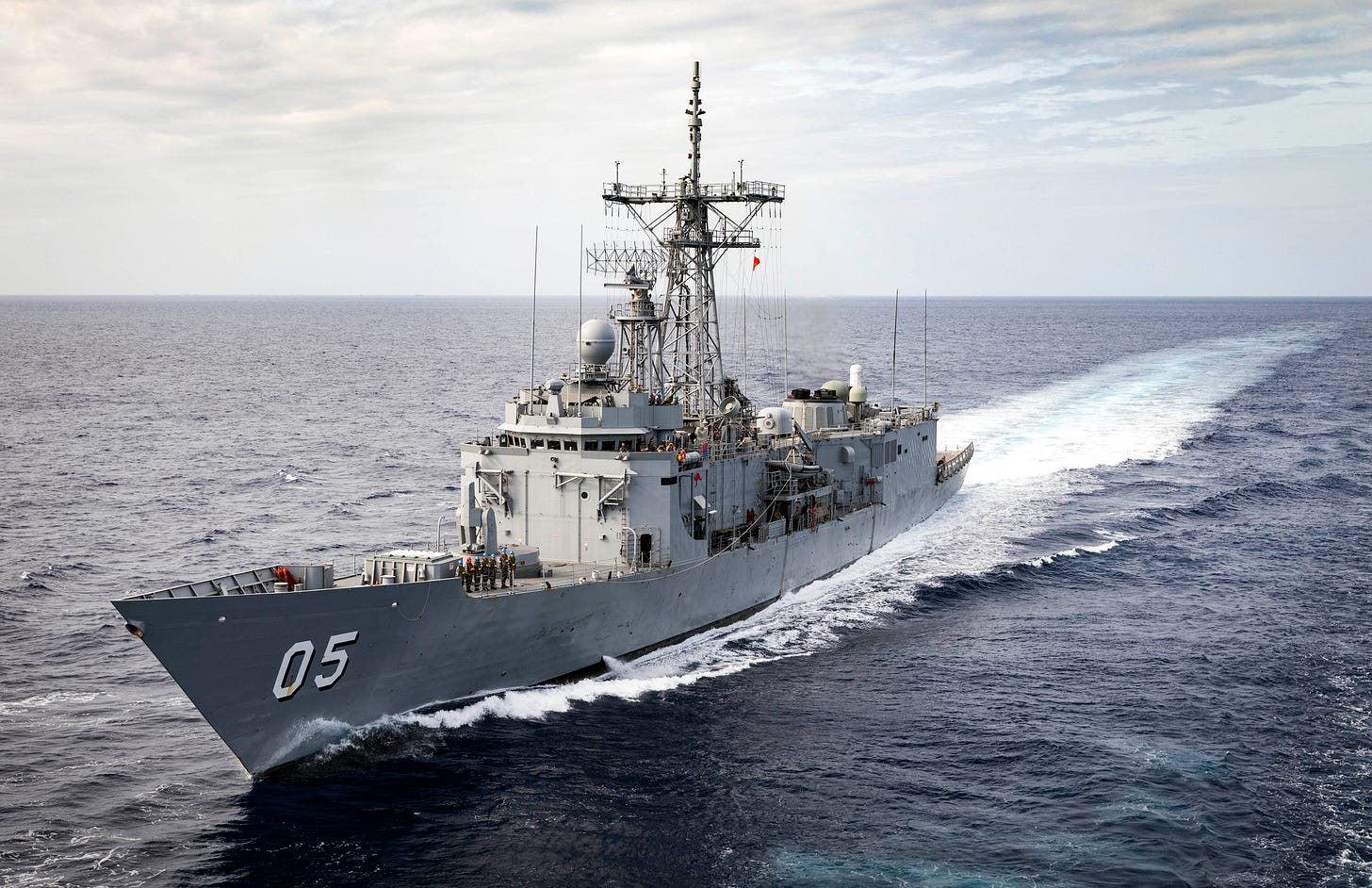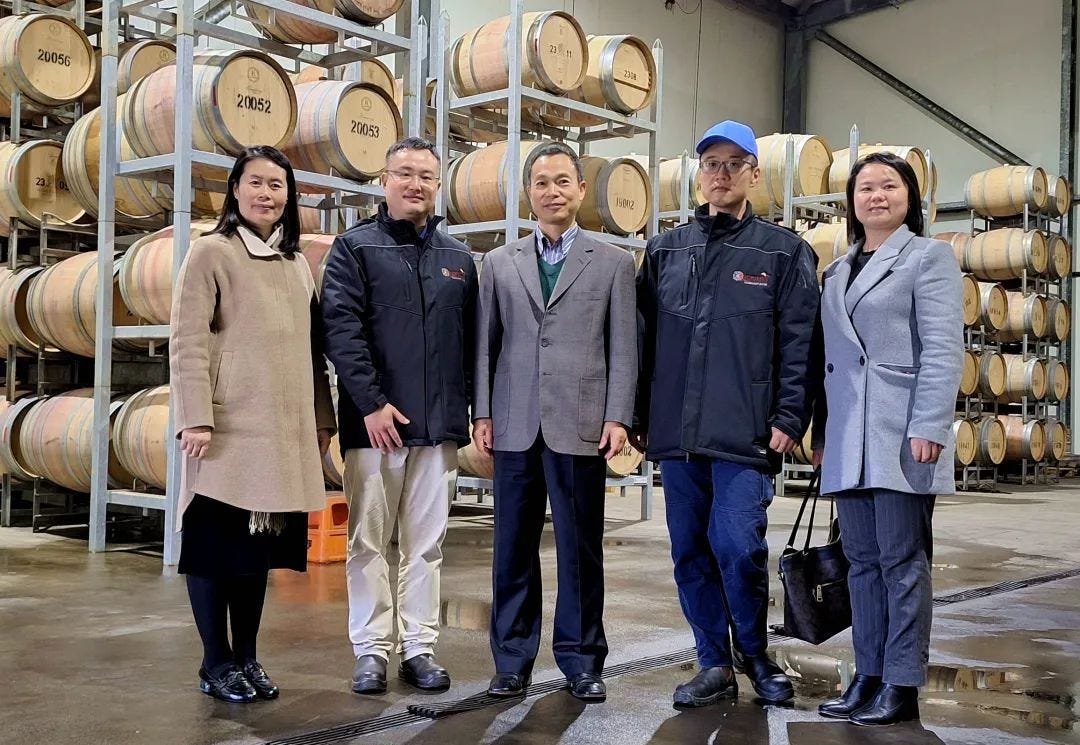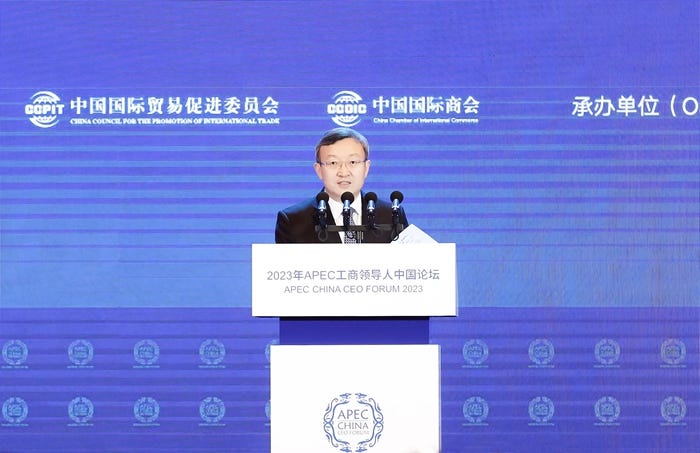Security ties with Taiwan and Strait transits, wine exports, and more CPTPP pressure
Fortnight of 12 to 25 June 2023
Australia's security ties with Taiwan and Strait transits
Foreign Minister Joseph Wu arguing in an interview in The Australian for a Taiwanese defence attaché in Canberra:
“I think it is very important for us to have somebody who can speak on behalf of the security agencies over here, especially (Taiwan’s) Ministry of National Defence, so that we can have a systematic or institutionalised way of engaging with each other and for information sharing, assessment sharing, things like that.”
Quick take:
Although Minister Wu’s call was left publicly unanswered by the Australian government, his interview did draw out some extra details about Canberra’s security engagement with Taipei. Following Minister Wu’s confirmation that the “Australian Office over here has started speaking with our security agencies,” the Taiwanese Ministry of Foreign Affairs revealed that the Australian Office in Taipei added a new Director of Strategic Affairs position in 2022, which is apparently responsible for engaging with the Taiwanese defence ministry and national security agencies. Although long rumoured, this was the first (that I’m aware of) public confirmation of such a role at the Australian Office in Taipei. Given that Minister Wu also called for a full-blown Australian defence attaché in Taipei despite presumably knowing about the establishment of the new-ish position, Taiwan is clearly angling for more security engagement with Australia. Still, the fact that the Australian government hasn’t (so far as I’ve seen) denied the existence of this position likely makes it a noteworthy new detail about the scope of the evolving security dimension of the Australia-Taiwan relationship.
Before I move on to broader implications, a sidebar observation for the foreign policy wonks: In responses to questions about this new-ish role in the Australian Office in Taipei, a spokesperson from Australia’s Department of Foreign Affairs and Trade noted that the Office “works across the full range of our interests in promoting our deep and productive unofficial relationship with Taiwan, including trade and investment, people to people ties [sic] and regional security.” At the risk of over reading one sentence, the addition of “regional security” here is conspicuous to my mind. I’m not 100% sure that it’s the first time that “regional security” has been cited as an interest via which Australia promotes its relationship with Taiwan. But it’s still a departure from the way in which Canberra typically frames the Australia-Taiwan relationship by reference to “trade and investment, education, tourism and people-to-people ties.” As always, please tell me if I’m missing details or have overinterpreted something. But this looks like a potentially significant evolution of the way in which Canberra publicly talks about the connection between Australia’s regional security interests and its ties with Taiwan.
Beyond these granular issues of interpretation, this episode points to a much broader policy question. What’s the right balance for Australia between publicly advertised versus discreet engagement with Taiwan? Is it better to establish something like a Director of Strategic Affairs position to enhance on-the-ground security contact with Taiwan but keep it under wraps to reduce the likelihood of blowback from China? (Even if the existence of the Director of Strategic Affairs role was never revealed publicly, Beijing would have presumably still known about it but might have been less inclined to object on the grounds that Australia was remaining, in China’s view, respectfully taciturn.) Or is there added value in openly signalling to China, Taiwan, the region, and the Australian public that Canberra is responding to developments in the Taiwan Strait by enhancing its ability to engage and share information with the Taiwanese defence ministry and national security agencies? This dilemma is already hard and it’s probably only going to get harder. As Australia seeks to manage the still-wobbly stabilisation of bilateral ties with China and Beijing ramps up its efforts to isolate Taipei, Canberra’s calls on whether to publicly reveal what it’s doing in and around Taiwan are likely to be nail-bitingly line ball.
Given space constraints, I won’t try and adjudicate all the pros and cons of publicly advertised and discreet engagement with Taiwan. (I’ll hopefully return to that question in more detail another time.) Moreover, it may be the case that the right approach is a mixture of sometimes opting for discretion and sometimes choosing publicity. For example, perhaps Australia should be more like the Philippines, Japan, and European countries in giving extra licence to parliamentarians to be more loud and proud when they visit Taipei, while also keeping a lid on initiatives like a new-ish Director of Strategic Affairs at the Australian Office in Taipei. The argument might be that awareness-raising is a big part of the rationale for parliamentary visits, hence the reason for more openness, while the value-add of security agencies talking is the working-level contact and intelligence it provides, hence the limited benefit of public announcements. Regardless, I digress. Short of going into all the complex calculations on these and similar questions, my simple observation would be that finding the right balance between discretion and publicity is tough. Whether in terms of security engagement, political visits or official and semi-official dialogues, Canberra is likely to face both growing pressure from Taipei to do more and do it openly combined with warnings—either explicit or implicit—from Beijing to dial back these activities and at the very least keep them out of the public eye.
Taiwan Strait transits are an interesting case in point. The last publicly confirmed Australian transit of the Strait was by the Royal Australian Navy (RAN) guided-missile frigate HMAS Melbourne in September 2018. (Please correct me if I’ve missed any publicly announced transits since then.) Given Australia’s growing appetite since circa 2020 to do and say more in relation to both Taiwan and cross-Strait security, it seems reasonable to speculate that the RAN and/or the Royal Australian Air Force (RAAF) would have conducted Taiwan Strait transits in the intervening five years but without the Australian government publicly announcing them. Of course, it’s admittedly entirely possible that Australia hasn’t conducted such a transit since 2018. If that’s that case, then that raises a bigger set of questions about Australia’s commitment to the status quo in the Taiwan Strait and its willingness to uphold the navigational rights and freedoms codified in the United Nations Convention on the Law of the Sea. But assuming that subsequent discreet RAN and/or RAAF transits have occurred since 2018, it’s fair to infer that conducting them without publicly telegraphing them avoided at least a small additional quantum of strain in Australia-China ties. The way in which Beijing objected to the public nature of the April and June US and Canadian Taiwan Strait transits suggests that China takes special offence when they are done openly. Or, as Beijing has described it, with the other side having “hyped it up publicly”.
Discreet Taiwan Strait transits might exercise the same navigational rights and freedoms and upset China less. Yet they’re also a missed opportunity to openly signal determination to uphold said rights and freedoms. To be sure, the signal won’t be lost on Beijing given that China would almost certainly be tracking all such transits. And the Australian government can still signal determination to uphold navigational rights and freedoms to key regional governments by privately sharing details of these transits. However, all of that will still leave publics in Australia and the region in the dark about what Australia is doing in the Taiwan Strait and why that matters for international law and global security. Simply put, if a military vessel or aircraft transits the Taiwan Strait without an accompanying press release, does it deliver the desired message at home and abroad? This certainly isn’t to argue that there’s a clear case for Canberra conducting a publicly telegraphed program of Taiwan Strait transits. But at the very least, the current approach of (presumably) discreet transits isn’t without downsides and may need regular reappraisal given the complex cost-benefit calculations associated with whether to publicly announce Australian activities in and around Taiwan.

Australian wine exports and a prime ministerial visit
From the read out of Consul General Long Dingbin’s 23 June visit to Margaret River wineries:
“Consul General Long said that Margaret River … wines are of high quality and are popular among Chinese consumers.”
Quick take:
Made at the time of visits to Bunbury and Albany, this trip to the Margaret River is the latest in a series of promising signals for Australian wine exporters. It follows agriculture Vice Minister Ma Youxiang’s seemingly happy jaunt to Canberra’s wine district in April and Minister for Trade and Tourism Don Farrell’s warmly received gift of a bottle of South Australian red to his Chinese counterpart while in Beijing in May. To be sure, neither this recent trip to the Margaret River nor these earlier signals mean that China’s duties on wine will meet their imminent demise. Consul General Long visited a lobster exporter in Geraldton in January this year and yet the prospects for this Australian product in China still seem uncertain and fraught with challenges. But this recent Margaret River trip provides yet another datapoint—albeit a small and inconclusive one—suggesting that the pathway for China to drop its duties against Australian wine remains wide open.
Needless to say, there’s no guarantee that China will dismantle these duties. Although Minister Farrell said in mid-June that China might remove its duties on barley in the “next couple of weeks,” the same “pathway” on the wine duties is far from a lock. China might tie this unwinding of wine duties to what Australia considers to be unacceptable preconditions. Perhaps Canberra taking a more permissive approach to Chinese investments or some level of Australian support (public or otherwise) for China’s entry into the Comprehensive and Progressive Agreement for Trans-Pacific Partnership (CPTPP). The removal of the wine duties could also fall victim to any number of exogenous shocks, including a severe ratcheting up of US-China tensions or turmoil between Taipei and Beijing. Though possible, these and other similarly gloomy scenarios look less likely than a continuation of the ongoing incremental improvement in Australia-China ties that we’ve seen so far in 2023. Despite the many areas of deep disagreement between China and Australia, both sides seem to want to ease the trade dispute. Beijing is still sending out clear signals that it hopes to “resolve each others’ concerns for trade and economic issues” and Canberra continues to recite the mantra that it’s in “Australia’s interest to export to China, but it’s also in China’s interest to receive those exports.” Assuming these stances don’t shift, then Australian wine looks set to flow back into the Chinese market with significantly reduced duties in the second half of this year.
At this point, some readers might ask whether I can be a bit more specific. If I was forced to take a punt, I’d guess that a pathway for the removal or at least significant reduction of China’s duties on Australian wine will have been announced by 4 November this year. Why that date in particular? Well, as I’ve previously speculated, the 50th anniversary of the first visit to the People’s Republic of China (PRC) by a serving Australian leader seems like a logical occasion for Prime Minister Anthony Albanese to make his much-debated and regularly queried trip to Beijing. Although the dates are yet to be confirmed, there are a range of reasons (that I won’t relitigate here) why a visit around late October/early November to coincide with this anniversary would suit both Beijing’s and Canberra’s political interests. Given China’s seeming willingness to replicate with wine duties the approach to removing barley duties combined with the Albanese government’s expectation that continued progress be made on easing trade restrictions before a prime ministerial trip, there’s a good chance that a pathway for removing or significantly reducing wine duties will have been agreed by 4 November.
One other little scheduling detail is worth flagging. It just so happens that the China International Import Expo (CIIE) backs onto the 50th anniversary of the first trip to the PRC by a serving Australian Prime Minister. Slated for 5-10 November this year, CIIE is an initiative of the Xi era that attracts high-level fanfare and diplomatic pomp and circumstance, including speeches by President Xi Jinping himself and attendance and addresses by foreign leaders. So, if I was going to get really granular and speculative with my prognostications, I’m imaging Prime Minister Albanese heading to Shanghai for CIIE after his visit to Beijing. Perhaps he’ll stop by Australia’s national stand at CIIE, where he might even share a tipple of Australian wine or a morsel of Australian lobster with President Xi. We’re obviously way down in the hyper-speculative weeds at this point. But it seems increasingly plausible given the convenient timelines and the diplomatic signals on both sides.

A full-court (CPTPP) press
A China Daily article paraphrasing remarks by commerce Vice Minister Wang Shouwen at an Asia-Pacific Economic Cooperation (APEC) China CEO Forum on 17 June:
“China is advancing the process of joining the CPTPP. The government has conducted in-depth and comprehensive research and evaluation on more than 2,300 articles of the CPTPP, and sorted out the reform measures and laws and regulations that need to be modified for China's accession to the CPTPP.”
Quick take:
Although China formally lodged its CPTPP application in September 2021, Chinese government representatives haven’t typically publicly enumerated the work that China is doing to accede to this trade agreement. But while Vice Minister Wang offered more details than usual, the overall message wasn’t novel. As I’ve previously documented, this is just the latest in a series of high-level and authoritative statements indicating Beijing’s seeming seriousness about getting into the CPTPP. China’s efforts to enter the CPTPP might be motivated by a range of other foreign policy objectives. But regardless of the possibly mixed motives, there’s less and less reason to doubt Beijing’s determination.
From an Australian perspective, this once again underscores the level of pressure that Canberra and other CPTPP capitals are likely to face from Beijing to back its bid. Understandably, Canberra isn’t giving much away for now. In a Q&A at the National Press Club on 2 June, Minister for Trade and Tourism Farrell made plain that the road for considering any new CPTPP bids would be long. Not only does the United Kingdom’s accession need to be finalised—something that Minister Farrell suggested might happen in July—but any other country seeking entry will need to gain consensus support from the CPTPP’s now-11 and soon-to-be-12 members. Then there’s the as-yet unanswered question of whether China can even meet the CPTPP’s standards. But those hurdles won’t stop Beijing from lobbying even harder once London has signed up. More ticklish still from Australia’s point of view, this renewed push from China is likely to coincide with extra effort from Taiwan to gain entry. As well as Taiwan’s Minister-Without-Portfolio John Deng advocating for Taiwan to join the CPTPP at the APEC Ministers Responsible for Trade Meeting in Detroit last month, Taiwanese officials haven’t eased off their longstanding push for Canberra to back their bid. Meanwhile, Taipei has been pressing its case with other CPTTP signatories, including Santiago and Lima.
Cooler heads would at this point remind us that Canberra and other capitals are unlikely to individually face invidious choices between bids from Beijing, Taipei, and other capitals. The CPTPP’s consensus-based approach means that each member can use the group’s collective decision-making as cover for not publicly taking positions on any one country’s effort to join. Like the Australian government, the preferred option for other CPTPP members might be to simply sidestep the questions of their own support for China’s and Taiwan’s bids by ambiguously reiterating that no collective decisions have been taken. That might work as a talking point, but it’s unlikely to prompt either Beijing or Taipei to go slower on their CPTPP pressure campaigns. So, expect more and stronger private and public entreaties from both Beijing and Taipei to back their respective bids.
As always, thank you for reading, and please excuse any errors (typographical or otherwise). Any and all objections, criticisms, and corrections are very much appreciated.





Another great update. Thanks!
I'd check UNCLOS and other relevant statutes before claiming, "Discreet Taiwan Strait transits might exercise the same navigational rights and freedoms and upset China less. Yet they’re also a missed opportunity to openly signal determination to uphold said rights and freedoms”.
The only rights and freedoms of navigation in the Taiwan Strait are those that China grants, since it meets all requirements for domestic waters, certainly under UNCLOS statutes.
China is being patient, as it usually is, while the world sees what assholes we are. FONOPs are working great.